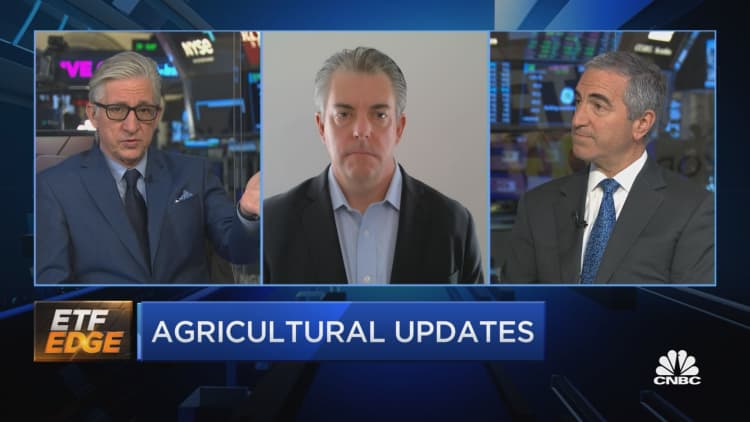
Despite Russia approaching a pivotal deadline to continue a deal that could affect the global grain supply, one expert doesn't see a disruption to the downturn in commodity prices.
"Russia and Ukraine combined, they're the biggest exporters of wheat in the world," Sal Gilbertie, CEO of Teucrium, told CNBC's Bob Pisani on "ETF Edge" on Monday.
"There's an oversupply of wheat in Russia right now," he said. "They need to move that grain."
The surplus comes as Russia threatens to abandon the Black Sea Grain Initiative, a deal bartered by the U.N. last July following the Russian invasion of Ukraine that permits the safe export of agricultural products from Ukrainian ports amid the war. It is set to expire on May 18.
"They go right to the end in terms of bluffing," Gilbertie said. "But it's in Russia's best interest to keep things running smoothly."
Teucrium manages exchange-traded funds that offer exposure to various agricultural commodities, but a distinguishing factor of the funds is the structure of their underlying holdings. The Teucrium Wheat Fund (WEAT), for example, spreads futures contracts across multiple maturities instead of concentrating holdings in front-month futures.
"Because you spread it out, we're rolling roughly one-third five times a year," Gilbertie said. "So, it's a lot less in terms of rolling and roll call."
In addition to WEAT, Teucrium offers four other ETFs with agricultural exposure: CORN, CANE and SOYB, as well as the Teucrium Agricultural Fund (TAGS).
"Generally, you're using this as a trading product, in which case you don't care where it holds," Gilbertie said. "But a lot of people allocate to grains. [Grains] spend a lot of time trading at their cost of production when there are times of surplus and balance."
Russian wheat inventories are almost 80% higher than the five-year average, Gilbertie said. He forecast that global agriculture prices should contract toward cost of production over the next year pending any disruptions stemming from climate or war-related conflict.
"Wheat prices have been coming down, but that wheat's got to get out of the Black Sea," he said. "And so, without [the Black Sea Grain Initiative], shipping will become uncertain, because you'll be in a war zone."
Despite renewed threats to discontinue the deal, Gilbertie believes Russia is still inclined to renew the initiative. However, prolonged conflict or expansion of the conflict could continue to harm Ukraine grain production, he said, underpinning valuation uncertainty for the commodity regardless of the current oversupply.
"Prices are high, you're motivated to produce," he said. "And that's what all commodity producers are doing. They're producing."





